|
|
|
Sort Order |
|
|
|
Items / Page
|
|
|
|
|
|
|
| Srl | Item |
| 1 |
ID:
100027
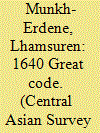

|
|
|
|
|
| Publication |
2010.
|
| Summary/Abstract |
Two recent studies, Johan Elverskog's Our Great Qing (2006) and David Sneath's The Headless State (2007), have made bold and fascinating contributions to overcoming the lingering legacy of representing and framing the pre-modern Inner Asian social and political order in terms of evolutionist, nationalist or nation-statist logics. Joining the cause and building on these works, yet critically examining them, this article argues that the late sixteenth and early seventeenth-century Mongolian political order was akin to that of the Holy Roman Empire and the 1640 Great Code was an Inner Asian parallel to the Treaty of Westphalia.
|
|
|
|
|
|
|
|
|
|
|
|
|
|
|
|
| 2 |
ID:
131427
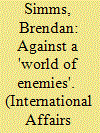

|
|
|
|
|
| Publication |
2014.
|
| Summary/Abstract |
Adolf Hitler's experiences during the First World War have been much discussed, with historians tending to concentrate on his involvement in the fighting and the operational lessons he later claimed to draw. Much less has been written about the impact of the war on his world view, though recent work has tended to suggest that his paranoid anti-Semitism was not yet visible during the conflict. Drawing on this latest research, but also on newly discovered sources and previously underused material, the author shows that Hitler's main preoccupation during the war and its immediate aftermath was the overwhelming power of Great Britain and its American ally. He associated these two powers with the alleged international Jewish economic conspiracy that had crushed the German empire. Hitler's anti-Semitism thus originated in an anti-capitalist, rather than anti-communist, discourse. He blamed Britain and the US for the rigours of the Versailles peace settlement, a moment which was far more politically formative for him than the experience of defeat itself. His encounter with American soldiers in the summer of 1918 also marked his first engagement with the global power of the United States and the start of a belief in the demographic weakness of the German empire which inspired his plans for Lebensraum in the east.
|
|
|
|
|
|
|
|
|
|
|
|
|
|
|
|
| 3 |
ID:
127311
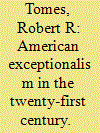

|
|
|
|
|
| Publication |
2014.
|
| Summary/Abstract |
Americans still believe their country is unique but are less convinced it has a special responsibility to lead. This has both domestic and international implications.
|
|
|
|
|
|
|
|
|
|
|
|
|
|
|
|
| 4 |
ID:
181860
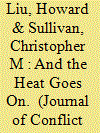

|
|
|
|
|
| Summary/Abstract |
Among security institutions, police occupy a unique position. In addition to specializing in the repression of dissent, police monitor society and enforce order. Yet within research studying state repression, how police institutions are used and deployed to control domestic threats remain under-explored, particularly as it relates to the dual functionality just described. In this study, we develop and test an explanation of police repression accounting for the bifurcation of Mann’s two modalities of state power: infrastructural power and despotic power. Infrastructural power allocates police resources to surveil dissidents and preemptively limit dissent’s emergence or escalation. Police deploy despotic power through repressive responses to political threats. Empirically, we employ unique data to investigate police repression and the modalities of power in Guatemala. To analyze how shifting the balance between infrastructural and despotic power affects police repression, we isolate damage occurring from an earthquake that exogenously reshaped the landscape of infrastructural power. Results affirm the role of infrastructural power in regulating the despotic power of the state. Where local infrastructure was most affected by the earthquake, the security apparatus lost the capacity to surveil nascent movements and predict their activity, thereby providing opportunity for dissidents to mobilize and forcing police to (over-)react rather than shutdown resistance preemptively. However, the intensity of state violence recedes as the state recovers from the infrastructural damage and regains its control of local district.
|
|
|
|
|
|
|
|
|
|
|
|
|
|
|
|
| 5 |
ID:
122363
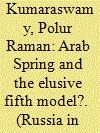

|
|
|
|
|
| Publication |
2013.
|
| Summary/Abstract |
If the Arab Spring were to bring about meaningful changes to Arab societies, what is needed is a political order that is not only democratic but also inclusive. To be credible, the Arab world, including its Islamists, will have to tread the long and painful path of consensus building. This method is inclusive and hence more enduring than electoral democracy.
|
|
|
|
|
|
|
|
|
|
|
|
|
|
|
|
| 6 |
ID:
126540


|
|
|
|
|
| Publication |
2013.
|
| Summary/Abstract |
This article reports on an audience costs experiment embedded into a survey of the British public (N = 2235). We extend previous research into audience costs in three main directions. First, we provide clear and direct evidence that they exist for a second-order democratic power, the United Kingdom. Second, we show that the extent of audience costs varies, and at times substantially, along with features of the crisis situation that have not been examined empirically in this context before. In particular, the type of crisis strongly influences public reactions both to bluffing in general and to the wisdom or otherwise of escalating crises before backing down. While audience costs do appear to exist for a UK Prime Minister, he or she cannot inflate them by moving up the escalation chain. Rather, a limited use of force tends to mitigate these costs among the British public because it appears to them a more consistent strategy. Third, we show that public disapproval of a failed bluffing strategy is stronger among the more politically engaged, increasing the likelihood that audience costs will be paid at the ballot box.
|
|
|
|
|
|
|
|
|
|
|
|
|
|
|
|
| 7 |
ID:
177896
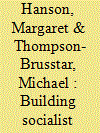

|
|
|
|
|
| Summary/Abstract |
Why do some attempts to use legal institutions to exert central state control fail, while others succeed? Through a controlled comparison of the Soviet Union (USSR) and the People’s Republic of China (PRC), we analyse the institutionalisation of the procuracy, an agency charged with enforcing central legal directives. We show that institutional design, competition, and political support during critical junctures created a positive feedback for the institutionalisation of the procuracy in the USSR but left it weak in China. These findings contribute to our understanding of institutional development, state-building, and authoritarian legal control.
|
|
|
|
|
|
|
|
|
|
|
|
|
|
|
|
| 8 |
ID:
117436
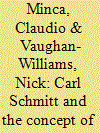

|
|
|
|
|
| Publication |
2012.
|
| Summary/Abstract |
The paper investigates the promise of Carl Schmitt's concept of 'nomos' for developing new spatial imaginaries apposite to the study of 'the border' in contemporary political life, as per the aims of the 'Lines in the Sand' research agenda. Schmitt introduced the idea of a 'nomos of the earth' to refer to the fundamental relation between space and political order. There have been various historical expressions of the nomos, from the Respublica Christiana, to the jus publicum Europaeum, to a post-World War II (dis)order yet to be adequately theorised. We aim to explore the relatively overlooked spatial ontology of Schmitt's work and suggest ways in which it might prompt alternative ways of thinking about borders and bordering practices as representative of broader dynamics in the relation between space and political order.
|
|
|
|
|
|
|
|
|
|
|
|
|
|
|
|
| 9 |
ID:
139850
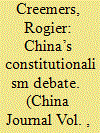

|
|
|
|
|
| Summary/Abstract |
In 2013, a debate on constitutionalism erupted between liberals advocating better implementation of China’s Constitution and anti-constitutionalist voices claiming that this would harm the political order and the reform project. The debate emerged against the background of a choppy political transition and proliferating social concerns, as well as hopeful expectations regarding the new leadership. However, the anti-constitutionalist position was closely aligned with the new Politburo Standing Committee’s agenda, which continues to reject the notion of a law-based political order and institutionalization of fundamental relationships between the Party, the state and citizens. This has significant implications for the direction of Chinese legal reforms and related scholarly understandings.
|
|
|
|
|
|
|
|
|
|
|
|
|
|
|
|
| 10 |
ID:
151221
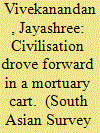

|
|
|
|
|
| Summary/Abstract |
Violence presents us with an interesting motif to study colonial politics, aptly captured in James Milne’s telling metaphor. Its inextricable association with colonialism implied a gradual conflation of political order with civilisation that is discernible in extant writings. The conventional paradigm in International Relations (IR) regards order as coterminous with the domestic domain and anarchy to be the structural attribute of international politics. This dichotomous divide permits little space for the hybrid states of existence of both anarchy and order that were often witnessed in the colonies and written about. The article examines the manner in which colonialism applied the notion of violence to the Indian context that was in denial of such complexities. It further argues that bringing imperial relations within the ambit of IR would help explain the differentiated interpretations of sovereignty that marked the parallel existence of the sovereign state system and the imperial political system.
|
|
|
|
|
|
|
|
|
|
|
|
|
|
|
|
| 11 |
ID:
140810
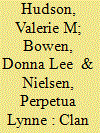

|
|
|
|
|
| Summary/Abstract |
We propose that the relative influence of clans is an important explanatory factor producing significant variation in state stability and security across societies. We explore the micro-level processes that link clan predominance with dysfunctional syndromes of state behavior. Clans typically privilege agnatic descent from the patriline and are characterized by extreme subordination of women effected through marriage practices. Particular types of marriage practices give rise to particular types of political orders and may be fiercely guarded for just this reason. We construct and validate a Clan Governance Index to investigate which variables related to women's subordination to the patriline in marriage are useful to include in such an index. We then show that clan governance is a useful predictor of indicators of state stability and security, and we probe the value added by its inclusion with other conventional explanatory variables often linked to state stability and security.
|
|
|
|
|
|
|
|
|
|
|
|
|
|
|
|
| 12 |
ID:
075744
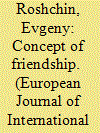

|
|
|
|
|
| Publication |
2006.
|
| Summary/Abstract |
The present article seeks to draw attention to and explicate the concept of friendship in a discipline which has long ignored it: International Relations. It examines the ways in which major political thinkers and international treaties addressed the concept in the process of the emergence of the Westphalia state system. The article traces correlative changes between the shift from vertical to horizontal friendship and the emergence of internal and external princely sovereignty which signified the new era in international politics. It argues that the recognition of formally equal statuses of political friends prepared the grounds for the regime of external sovereignty. It also suggests that friendship was a key concept describing political order, included or not in the friend/enemy antithesis, in early Modernity. The subsequent ambiguity of the modern concept of friendship in international politics springs from its constant reinterpretation in the context of royalist and republican ideological polemics.
|
|
|
|
|
|
|
|
|
|
|
|
|
|
|
|
| 13 |
ID:
090259
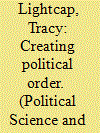

|
|
|
|
|
| Publication |
2009.
|
| Summary/Abstract |
Surveys indicate that there is more interest today in politics among college students than has been the case in the recent past. This article describes a multidisciplinary freshman seminar aimed at using that interest to promote student engagement and the Reacting to the Past simulations at the course's center.
|
|
|
|
|
|
|
|
|
|
|
|
|
|
|
|
| 14 |
ID:
132468
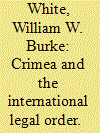

|
|
|
|
|
| Publication |
2014.
|
| Summary/Abstract |
Putin's exploitation of the tension between the principles of non-intervention and self-determination is in the tradition of great-power interaction with international law. But Russia's interpretation sets dangerous precedents.
Crimea is Russia's. The March 2014 referendum and Russia's subsequent annexation of Crimea are now events of history, even while the territorial borders and political future of the rest of Ukraine remain contested. Yet, as international attention has moved from Sevastopol to Kiev and more recent crises elsewhere, a key balance between two of the most fundamental principles of the post-Second World War international legal and political order remains at stake.
|
|
|
|
|
|
|
|
|
|
|
|
|
|
|
|
| 15 |
ID:
086707
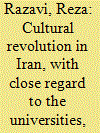

|
|
|
|
|
| Publication |
2009.
|
| Summary/Abstract |
The cultural revolution (1980-83), has been regarded by the elite in Iran as one major step towards the establishment of Islamic values in the universities. Twenty-eight years after those events, the elite in Iran are still struggling to implement their policies effectively in universities. The sudden rise in the political activities of the student movement during Mohammad Khatami's presidency (1997-2005) was in many ways a disappointing development for those who had initiated the cultural revolution. There was a general feeling that under the new president, Mahmoud Ahmadinezhad (2005-present), the student movement activities would decline. However, this has not been the case. The new upsurge in the activities of the student movement in Iran has raised a significant question: why has there been a revival in these activities under a more conservative social and political order? This article attempts to examine this central issue by re-examining the events that contributed to the rise and resistance to the cultural revolution. This article will also discuss contemporary materials and will highlight a number of different issues which will shed new light on the understanding of this topical subject.
|
|
|
|
|
|
|
|
|
|
|
|
|
|
|
|
| 16 |
ID:
186973
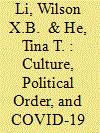

|
|
|
|
|
| Summary/Abstract |
WILSON X.B. LI and TINA T. HE examine the determinants of country responses to COVID-19. They build and apply a theoretical model to predict that countries with collectivist cultures, with higher government capacity to effectively formulate and implement sound policies, and/or with higher social trust will perform better in handling the pandemic. Their empirical analyses on cross country data in terms of COVID-19 deaths report results consistent with their model prediction
|
|
|
|
|
|
|
|
|
|
|
|
|
|
|
|
| 17 |
ID:
119437
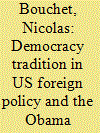

|
|
|
|
|
| Publication |
2013.
|
| Summary/Abstract |
This article proposes a three-level analysis of the democracy tradition in American foreign policy that identifies its ideational, strategic and policy dimensions and situates Barack Obama's presidency to date within it at each level. At the heart of this approach is the understanding that the motivations and practice of the United States' democracy promotion are shaped by its ideas about national identity, political order, national interest and international relations.
This is the ideational source of the democracy tradition, which, as US power has grown, has led increasingly to decision-makers setting strategic goals that include democratization abroad as a facilitator of other US goals. Only slowly has this led to the development of specific policies to that end, though, and democracy promotion as a discrete policy field mostly developed from the 1980s onwards. Democracy promotion went through a 'boom' after the end of the Cold War as the United States enjoyed unparalleled power on the international stage.
It is clear that Barack Obama and his administration belong firmly in the democracy tradition at the ideational, strategic and policy level, and they have given no cause to expect any major change in his second term as far as democracy promotion is concerned. It is in any case a mistake to think that changes in the democracy tradition come from particular leaders; rather, it is the changing international environment confronting US foreign policy that is more likely, in the longer term, to lead to a shift away from democracy promotion.
|
|
|
|
|
|
|
|
|
|
|
|
|
|
|
|
| 18 |
ID:
106875
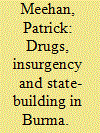

|
|
|
|
|
| Publication |
2011.
|
| Summary/Abstract |
The mainstream discourse on the political economy of drugs has emphasised the negative correlation between drug production and state capacity, with the presence of a thriving drugs trade seen as both a sign and a cause of weak states. Through an analysis of the drugs trade in Burma this study argues that such an approach is deeply flawed. Focusing on the period since the 1988 protests it argues that the illicit nature of the drugs trade has provided the state with an array of incentives (legal impunity, protection, money laundering) and threats (of prosecution) with which to co-opt and coerce insurgent groups over which it has otherwise commanded little authority. Although the state's involvement in the drugs trade was initially driven by an expedient desire to co-opt insurgent groups following the 1988 protests, this study also argues that over time it has provided an arena in which more immanent and largely unanticipated processes of state formation, namely the centralisation of the means of violence and extraction, have gradually been built. Rather than being a sign of corruption-induced state incapacity, the state's involvement in the drugs trade has thus become a central arena through which state power has been constructed and reproduced.
|
|
|
|
|
|
|
|
|
|
|
|
|
|
|
|
| 19 |
ID:
130978
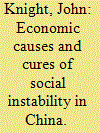

|
|
|
|
|
| Publication |
2014.
|
| Summary/Abstract |
China's leaders have often expressed concerns about social instability, viewed as a threat both to the political order and to continued rapid growth. Slower growth might, in turn, further undermine social stability. Using survey data, the present paper examines the economic determinants of social instability. Four main determinants are identified: past and expected growth of income, income inequality, economic insecurity and misgovernance. The paper then considers possible policies to reduce social instability, examining each of the determinants in turn.
|
|
|
|
|
|
|
|
|
|
|
|
|
|
|
|
| 20 |
ID:
126580
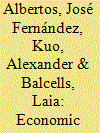

|
|
|
|
|
| Publication |
2013.
|
| Summary/Abstract |
Who do citizens blame for the recent European economic crisis? In this paper, we test theories about blame attribution with respect to the economic crisis. We argue that blame for the crisis is partially conditioned by partisan bias and framings of the crisis as being related to globalization. We test the argument with new survey data and a survey experiment from Spain. In the experiment, respondents receive different framings of the economic crisis which are endorsed by different political parties and non-partisan organizations. We obtain the following findings: (i) blame for who is responsible for the economic crisis is greatly affected by partisanship; (ii) making globalization as a cause of the crisis salient exonerates the government of blame, but only for co-partisans of the government; and (iii) citizens are willing to blame other globalization-related factors for the crisis, in particular, European governments and blame the domestic government less. The results expand our understanding of public opinion dynamics during major economic recessions and also suggest conditions under which "scapegoating" globalization can occur.
|
|
|
|
|
|
|
|
|
|
|
|
|
|
|
|
|
|
|
|
|